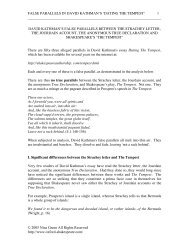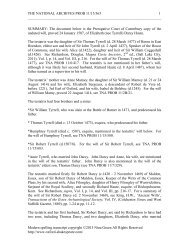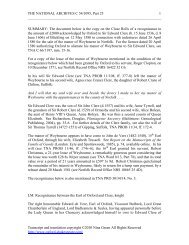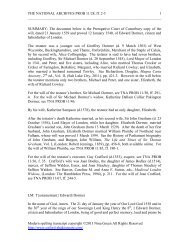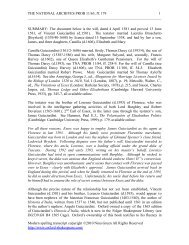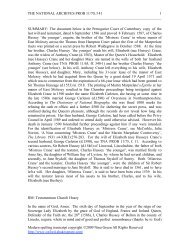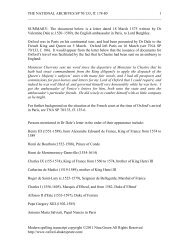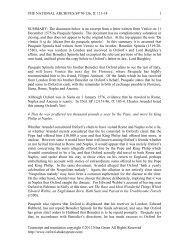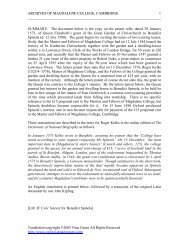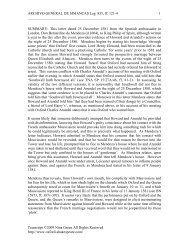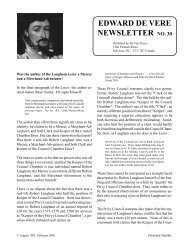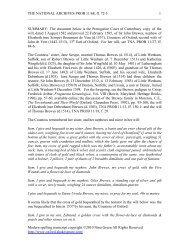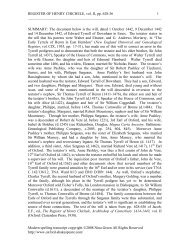GREENE'S FAREWELL TO FOLLY 1 Modern spelling tran
GREENE'S FAREWELL TO FOLLY 1 Modern spelling tran
GREENE'S FAREWELL TO FOLLY 1 Modern spelling tran
You also want an ePaper? Increase the reach of your titles
YUMPU automatically turns print PDFs into web optimized ePapers that Google loves.
GREENE’S <strong>FAREWELL</strong> <strong>TO</strong> <strong>FOLLY</strong> 6<br />
________________________________________________________________________<br />
of their abode was so solemnly seated, began at the enteraunce [sic for ‘en<strong>tran</strong>ce’] into<br />
the base-court to use these words:<br />
Gentlemen, the learned and wise worldlings whom experience and wisdom hath<br />
privileged to censure rightly of the due expense of time have thought with the physician<br />
that as the stomach hath his orifice strengthened as well with the juice of bitter<br />
wormwood as with the sap of sweet liquorice, so the mind oft steppeth as soon to content<br />
by being passionate as pleasant. Desire hangs not always on the heels of delight; man<br />
hath his time to meditate, and Holy Writ tell us that as we have a day of mirth, so we have<br />
a day to mourn. Solomon, whose content passed all proportion of measure, counted all<br />
things vanity that stooped to the centre of the earth. Alexander, amidst all ye<br />
embassadors at Babylon, stole three days to be solitary. Philip would be put in<br />
remembrance of his mortality. And we, gentlemen, that have lived pleasantly at Florence<br />
wearing out time with vanity, may now refine our senses, dulled with the taste of sundry<br />
vain objects, and for a week or two betake ourselves to this solitary place, wherein I think<br />
to find no other pleasure but a sweet meditation and friendly conference of the vain<br />
suppose of such as think none philosophers but epicures, and none religious but atheists.<br />
Thus, gentlemen, I appoint your penance, and therefore show me your opinion by your<br />
countenance.<br />
Signior Peratio, who was nephew to Jeronimo, made answer for the rest, and said they<br />
were all content, wherewith the old county leading the way entered the house, where<br />
finding all things in a readiness, they went to dinner. The fresh air had procured a good<br />
appetite, that little talk passed till they had ended their repast. Dinner being done,<br />
counting it physic to sit awhile, the old Countess spying on the finger of Signior Cosimo<br />
a ring with a death’s-head engraven, circled with this posy, Gressus ad vitam, demanded<br />
whether he adored [sic?] the signet for profit or pleasure.<br />
Signior Cosimo, speaking in truth as his conscience willed him, told her that it was a<br />
favour which a gentlewoman had bestowed upon him, and that only he wore it for her<br />
sake.<br />
Then, quoth the Countess, ‘tis a whetstone to sharp fancy.<br />
If it be, madam, quoth Cosimo, I am not so old but I may love.<br />
Nor so young, sir, quoth she, but that you may learn by that to leave such folly as love.<br />
No doubt nature works nothing vain. The lapidary cuts not a stone but it hath some<br />
virtue; men wear not gems only to please the sight, but to be defensives by their secret<br />
operations against perils, & so, Signior Cosimo, would I have you use the gentlewoman’s<br />
favour, not for a whetstone to further folly, but for a cooling card to inordinate vanities.<br />
Themistocles wore in his shield the picture of a stork, his motto antipelargein [=Repay<br />
kindness you have received], for that he would not be stained with ingratitude. Socrates<br />
had but one toy in his house, and that was the counterfeit of patience, for that he had a<br />
shrew to his wife.<br />
<strong>Modern</strong> <strong>spelling</strong> <strong>tran</strong>script copyright 2007 Nina Green All Rights Reserved




